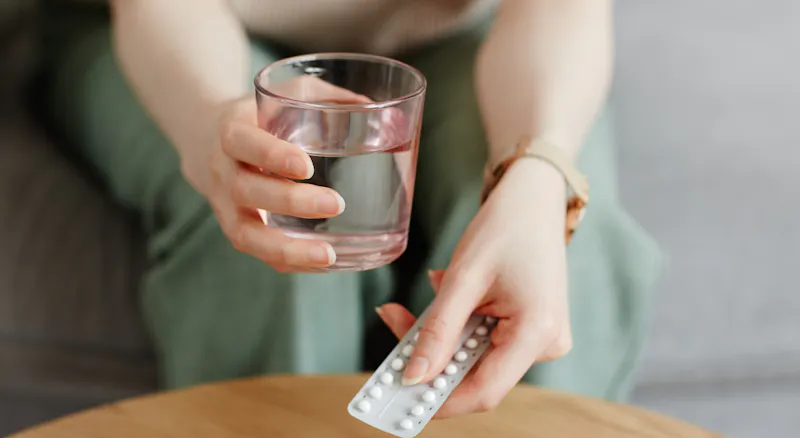Coming off the pill: Side effects, benefits & what to expect
What's covered?



Whether you decide to stop contraceptive pills because you want to get pregnant or it's simply no longer working for you, it's essential to know what to expect. In this article, we explain the changes in your body, the side effects, and management tips.
What happens when you stop taking birth control pills
When you stop taking your oral contraceptive pill, you’re no longer receiving a consistent stream of synthetic hormones. As the synthetic hormones leave your body, you can experience some side effects.
Over time, your body will return to its normal rhythm of producing its own hormones.
The first period you'll have after stopping the pill is called a withdrawal bleed. After this first bleed, it may take a while for your cycles to regulate.
If your periods were irregular or painful before starting hormonal contraception, this may be the case again. The contraceptive pill could have masked a reproductive condition like polycystic ovary syndrome (PCOS) or endometriosis.
How does the pill affect your body?
The combined pill is the most commonly prescribed oral contraceptive. It contains synthetic forms of the female hormones oestrogen and progesterone.
Your ovaries produce these hormones naturally, but when you take the pill, the artificial hormones override them to stop the release of an egg (ovulation). Because there's no egg to release at the end of your menstrual cycle, the bleeding you get on the pill isn't a 'natural' period.
The pill also works by thickening the mucus lining your uterus (womb), making it harder for sperm to reach an egg.
Reasons to stop taking the pill
Oral birth control is a common, safe, and effective form of contraception. It's also often prescribed to manage hormonally-driven conditions like endometriosis, PCOS, and premenstrual dysphoric disorder (PMDD)
However, there are several reasons why you may choose to avoid taking the pill.
Hormonal side effects
Like any other medication, each version of the pill has side effects. These can include:
- abdominal pain
- headaches
- mood changes
- nausea
- decreased libido
- vomiting
While some women report weight gain when taking the pill, large research studies haven't found this to be true. Other evidenced side effects, like mood changes, may be an underlying cause of weight changes.
Elevated likelihood of breast cancer
The contraceptive pill can slightly increase the risk of breast cancer. However, the risk is small and temporary, and it goes away after you stop taking the pill
For women with a history of breast cancer, the risks may outweigh the benefits. If you're unsure about your risk factors, it's a good idea to speak with your doctor.
Increased risk of blood clots
Birth control pills are known to increase the risk of having a blood clot, which can be dangerous. While the absolute risk is low for healthy women, the risk is higher in those with risk factors like smoking, being overweight, and having a family history of venous thromboembolism (VTE).
Speak to your doctor if you're concerned about blood clots, especially if they run in your family.
You want to get pregnant
You might be ready to come off the pill if you want to try to conceive. Being on the pill for several years won't affect your ability to fall pregnant.
Synthetic hormones can take time to leave your system, and it may take several months for your cycles to regulate.
The pill itself doesn't affect fertility, but it may have masked another condition like PCOS. This condition can affect your fertility.
If you're trying to conceive, you can understand your fertility hormones by doing a blood test.
Side effects of coming off the pill
As your hormones adjust, you might experience some temporary side effects. These include:
- irregular periods
- missed periods
- heavier or lighter periods
- mood changes
- acne
What to do when going off the pill
There's no right way to go off the pill. You can stop in the middle of the pack or finish your current pack: it's entirely up to you.
Some women choose to complete their pack so that it's easier to track their cycle after stopping. However, your cycles may be irregular to start with, meaning the choice is very personal.
When preparing to stop taking the pill, there are a few factors you'll want to consider.
Pick an alternative form of contraception if needed
If you don’t want to conceive, it's a good idea to decide on your alternative method of contraception before stopping the pill. This is because it's possible to fall pregnant right away.
Some non-hormonal options include:
- cervical caps or diaphragms
- condoms
- copper intrauterine device (IUD), or coil
You can also choose an alternative hormonal option such as:
- hormonal intrauterine system (IUS), or coil
- contraceptive patches
- contraceptive implant
- vaginal rings
- the progestin-only pill (mini pill)
Prioritise self care
You may feel physical and emotional changes as your body adjusts, so use this time to take care of yourself. Ensure you're getting enough sleep, eating nutritious food, and moving your body in a way that feels good.
Journaling and at-home meditation can help with mood changes. But if you're finding them hard to manage, speak with your GP to get support.
When to contact a doctor
If you still don't have a regular period after three months of stopping the pill, you should speak with your doctor. They may want to rule out underlying conditions, like PCOS or endometriosis, that the pill might have been masking.
Additionally, if you have irregular bleeding, pain, or concerns about your periods, it's a good idea to seek help.
Many people who stop taking the pill do so in order to try to conceive. If you've been having regular, unprotected sex for a year or more and haven't fallen pregnant, contact your doctor.
If you're aged 36 or older, it's a good idea to speak with your doctor sooner. They can explain fertility treatment options to you.
Takeaway
Stopping the contraceptive pill is a personal decision, and it's normal to experience temporary changes like irregular periods or mood shifts as your body adjusts. Self-care strategies can help with side effects, but if you have any issues, it's a good idea to contact your doctor.
- Cooper, B. & Patel, P. (2024). Oral contraceptive pills. https://www.ncbi.nlm.nih.gov/books/NBK430882/
- NHS. (2023). Diagnosis: Infertility. https://www.nhs.uk/conditions/infertility/diagnosis/
- Fitzpatrick, D. et al. (2023). Combined and progestagen-only contraceptives and breast cancer risk: A UK nested case-control study and meta-analysis. https://journals.plos.org/plosmedicine/article?id=10.1371/journal.pmed.1004188
- Gallo, M. et al. (2011). Combination contraceptives: effects on weight. https://www.cochranelibrary.com/cdsr/doi/10.1002/14651858.CD003987.pub4/full
- Kamani, M., Akgor, U. & Gultekin, M. (2022). Review of the literature on combined oral contraceptives and cancer. https://pmc.ncbi.nlm.nih.gov/articles/PMC9377820/
- Lidegaard, Ø. et al. (2011). Risk of venous thromboembolism from use of oral contraceptives containing different progestogens and oestrogen doses: Danish cohort study, 2001-9. https://www.bmj.com/content/343/bmj.d6423
- NICE. (n.d.). Ethinylestradiol with levonorgestrel. https://bnf.nice.org.uk/drugs/ethinylestradiol-with-levonorgestrel/#side-effects
- NICE. (2024). Which methods of contraception are available in the UK? https://cks.nice.org.uk/topics/contraception-assessment/background-information/available-contraceptive-methods-in-the-uk/
- Stegeman, B. et al. (2013). Different combined oral contraceptives and the risk of venous thrombosis: systematic review and network meta-analysis. https://www.bmj.com/content/347/bmj.f5298